It’s been a quiet couple of years in the Woodlands. In the past few years the designers at Leder Games have taken their turn as pirates, kings, and most recently, space explorers. But they haven’t forgotten about the Woodfolk and their adorably violent conflicts. And now they’ve started a Kickstarter for the next big expansion for their monster hit strategy game Root: The Homeland Expansion.
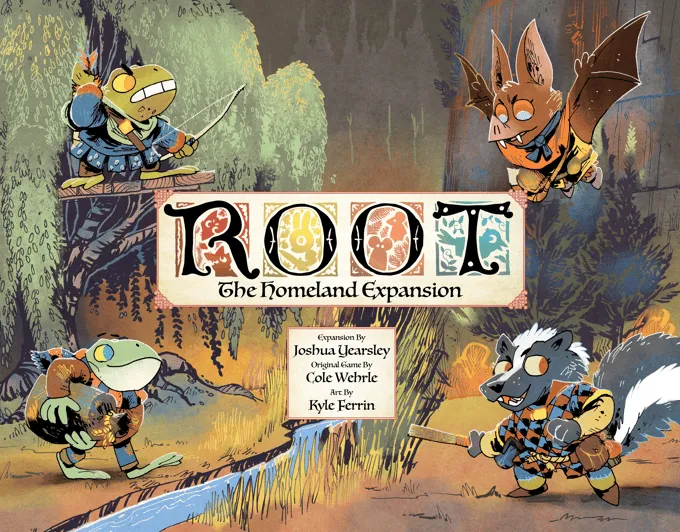
The expansion, like previous releases like The Marauder Expansion and the Underworld Expansion, adds three new factions to the game: The Lilypad Diaspora, who return to their homeland after a long ago exile and are as ready for war as they are for peace, The Twilight Council, nocturnal politicians with an eye towards unity, and The Knaves of The Deepwood, an alliance of shifty vagabonds who have discovered there’s safety AND profit in numbers. I sat down with the game’s designer Joshua Yearsley to learn more about these factions and what it means to try to make peace in a Woodland ravaged by war.
FM: It’s been a couple years since The Marauder Expansion to Root. What are your thoughts on the “state” of Root right now and what was the impetus for designing the new expansion?
Josh Yearsley: Root is in a great place. The response to the Marauder Expansion was extremely positive—people really connected with the new factions, advanced setup is seeing a lot of use especially in more competitive circles, and the hirelings seem to be fulfilling their promise of fleshing out games with low player counts. Dire Wolf, our digital partner, reports that people are clamoring for the Marauder to be ready, as well, and it’s coming around the corner. I also had a chance to go to Root Con last year, which was a blast and was super well-run; hats off to the organizers.
There are three criteria for assessing whether we want to do another expansion: Is the team excited, are the fans excited, and is there fertile design space left to explore? All three are definitely true for Root, so we went for it!
What were your main goals when starting out the project?
JY: I had two: Focus on groups and movements that must approach the Woodland War from a non-violent or less-violent angle, and create factions that encourage significant table-talk and player politicking, similar to the Riverfolk factions, while working better than the Riverfolk factions at lower player counts.
FM: How did you decide which animals to use for The Homeland Expansion?
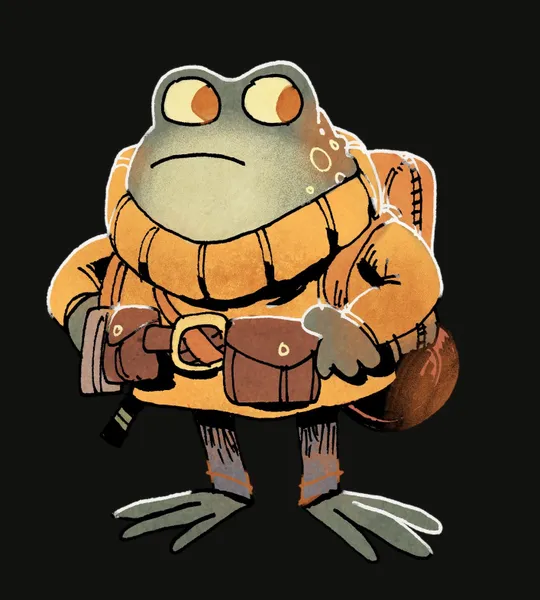
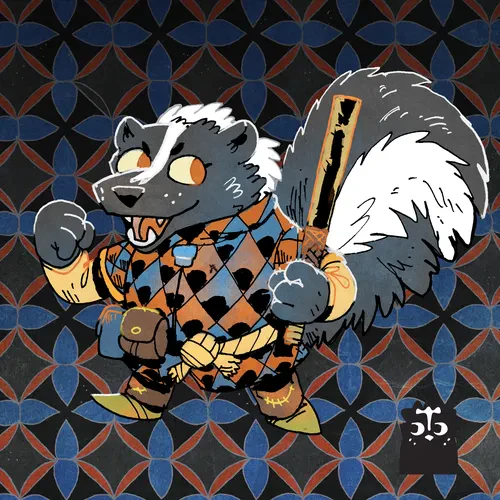
JY: For the Diaspora, there are a few reasons: First, frogs are migratory animals; I live near wetlands and it’s always amazing to see whole bunches of them hopping across the road at the right time of year, followed by the beautiful (and sometimes deafeningly loud) chirping at night once they’ve settled in. Second, because they were going to become a new suit, the faction’s face silhouette had to be quite distinct from pre-existing ones, and the frog face really fit the bill there. Finally, we have a running theme of aquatic or amphibious creatures being somewhat outsiders or outcasts in the Root universe—think the Otters and Lizards—so it felt appropriate to continue that theme here.
For the Council, the animal needed to feel like it would be at home all around the forest. The bird suit is wild in Root because they hold some sway everywhere, so extending this feeling to the bats felt like a nice fit. Kyle charmed me with some early art, so it stuck. We did want to make sure that the bat aesthetic didn’t hit too close to “spooky bats” Halloween territory.
Both new factions seem to be very much concerned with the negative results of conflict, the destruction it causes in the case of the Twilight Council and the displacement it causes in the case of the Lilypad Diaspora. Was this an intentional choice?
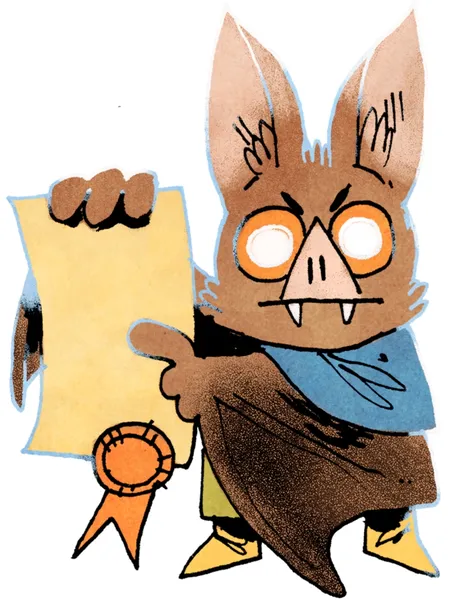
JY: Absolutely. The expansion is called The Homeland Expansion because I want players to think about the Woodland as a home, not just as a stomping ground for the war. But I wanted to point out that the war not only harms the Woodland’s inhabitants horribly, but they’re participating in the war too! This duality is presented in both the Council and Diaspora: The Council is trying to get the Woodland to recognize that they can grind the war to a halt through collective action, but the Woodland has to actually, you know, stop participating in the war for that to happen. The warmongers depend on the Woodfolk to keep it going. The Diaspora say they want peace, but integration always brings tension—they also need to protect themselves, since a war is going on, but that desire can tip into unprovoked violence!
FM: How do you fit factions like this into a game centered around conflict?
JY: Even though these factions are oriented toward less violent means, they are not totally non-violent. I wanted to emphasize a greater breadth of options for resolving conflict that include the possibility of peace, but it’s never going to be totally bloodless on any side. Conflicts are inherently messy, and even the most idealistic group of people will sometimes do abhorrent things. But on a larger scale, conflicts don’t have to be violent! I want these factions to show that, even when you’re not killing someone, in a war there are plenty of ways to generate conflict. Because each faction scores uniquely, any action you take will favor one faction over another in some way. So as long as the new factions affect player politics, map texture, and play options in a fresh way, I’ve succeeded.
FM: What was it like engaging with the idea of diaspora and weaving it through the faction’s identity?
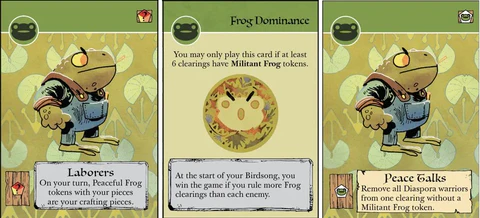
JY: Diasporas are a critical group archetype to think about if you want to understand history. Migrations of people have changed the world over and over again, and people’s core identities are formed in large part by the social groups they feel they are part of and what they consider to be “home.” I do have some personal attachments to these ideas: I grew up in the LDS Church. My great-great-great-grandfather, David Dutton Yearsley, was part of the group of Mormons who migrated to found Nauvoo after a series of conflicts with Missouri’s government. The term “promised land” came up a lot in Sunday school. As a teen, I would learn a lot more about the violence of this dispersal and settlement, and over time I’ve become more and more interested in the subject.
There are two big things I want to get across in this faction: First, no group of people is a monolith. The faction is not strictly peaceful or militant—it is a pastiche of people who have different priorities and goals, which are in turn influenced by the actions of others at the table. Even though ultimately you’re scoring points through peaceful integration, you have to manage the militant parts of your faction as well. You have some control over this, but not total control.
I want the player to feel a little pushback from the faction—you’re not a god or even an autocrat. Second, there are so many examples of hegemonic powers using diasporas as political wedges, scapegoats, laborers, and more—it felt extremely important to include. To represent this, I take advantage of the new Frog deck, which gives other factions opportunities to coexist with the Diaspora, leverage them for their own ends against third parties, and even influence the Diaspora to do things harmful to its own interests.
FM: How does the Twilight Council relate to the Woodland Alliance, where might their conflicts lie?
JY: The Woodland Alliance is a classic revolutionary faction. They want to overthrow the Woodland powers that be—broadly the Cats (The Marquise de Cat) and Birds (The Eyrie Dynasties)—and likely set up their own government. To do this, they use rabble-rousing techniques: provoke outrage in order to gain sympathy and support for their guerrilla war. They want to accelerate the war in order to win it. They stage revolts and burn buildings and run a military force.
The Twilight Council, in contrast, isn’t trying to win the war and start their own government. They’re Woodland elders who, in peace times, help mediate local disputes between the people. (Farmers get into arguments over who has the right to a plot land, and so on. Somebody has to figure it out.) Now that the war is on, they’re leveraging these cultural ties to end it! To achieve this, they have a carrot and a stick: They convene assemblies in order to give the Woodland a chance to come together and collectively throw down the sword. But they are not afraid to raise defenses for their assemblies and the Woodfolk if need be—they are not pure pacifists.
The Woodland Alliance will find the Council’s assemblies to be effective ways to suppress their opponents while they are still building up their support toward outright revolt, but they will need to balance their desire to mobilize all their cards as militant Supporters with representation at these assemblies. Few will take them seriously as desiring peace if all they do is revolt.
FM: One Vagabond was enough trouble, but three!? Where did the idea come from for the Knaves of Deepwood and how do you create a faction out of a character like the Vagabond?
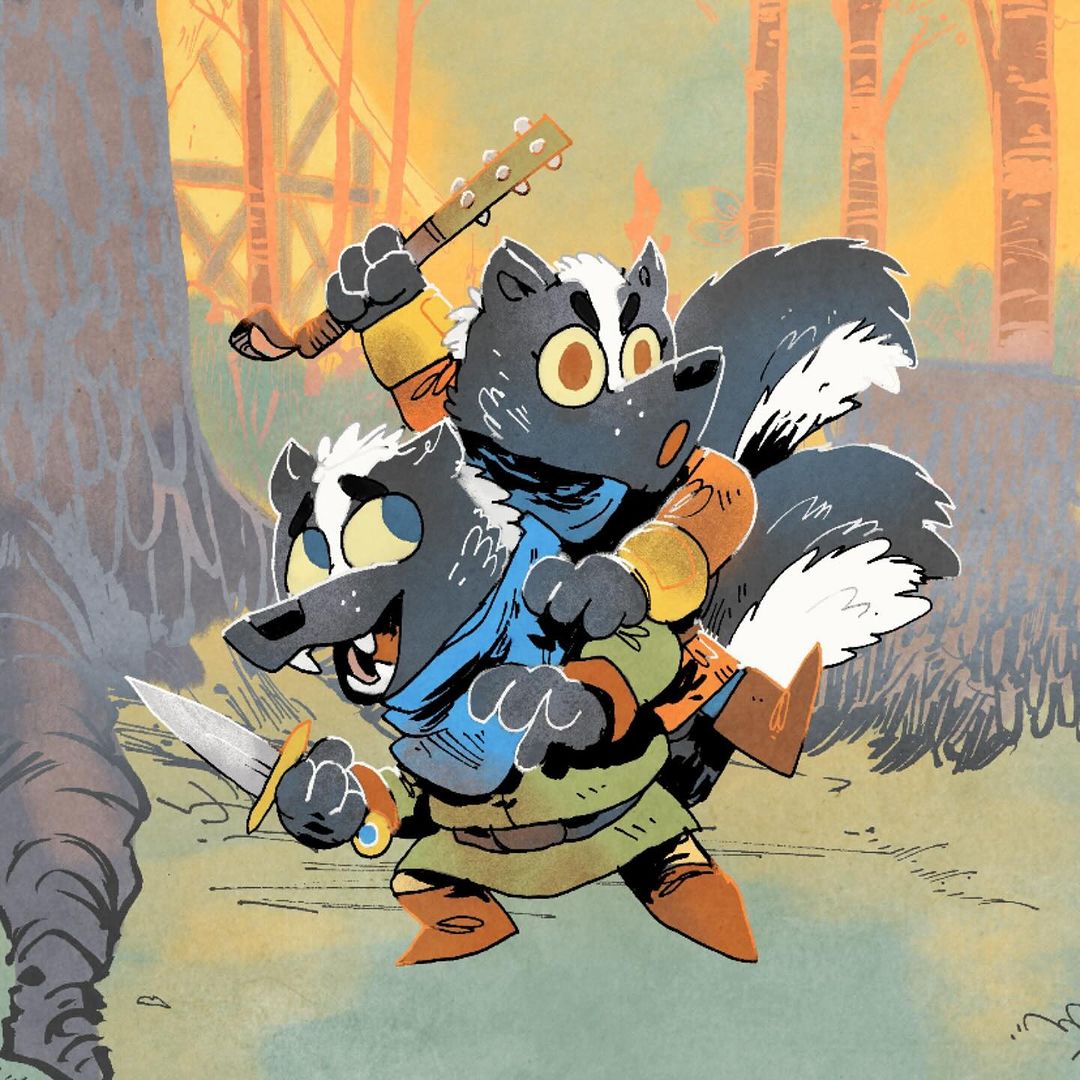
JY: The idea of a multi-Vagabond faction has been floating around the office and the Internet for a long time. I wanted to pursue this faction because there’s such a wide split in people’s sentiment about the Vagabond. Some love it, and some hate it, so it seemed like a natural fit to create a faction that let the Vagabond-lovers have even more Vagabond in more ways, and at the same time let the Vagabond-haters use their Vagabond pieces rather than letting them sit and collect dust.
It’s important that the Knaves don’t just feel like three Vagabonds, though. The Vagabond, contrasting all other Root factions, is kind of a fantastical character. They’re the ronin, the lone ranger, the mythical hero. I wanted to tie the Knaves in a little bit more to real-world groups.
FM: How do the Knaves fit into the broader politics of the forest?
JY: Where there is conflict, there is opportunity. Much like the Otters, the Knaves want to profit off the war by taking warriors as hostages and ransoming them back to their factions. They claim that they’re doing this to help the needy, Robin Hood style, and some in the Woodland say this too, but I’ll leave it ambiguous in play whether this is actually happening.
FM: How do you design a shifting map like The Marsh map? What are your goals in it and the Gorge map to change each game?
JY: We are currently pretty early in map development—the factions have been playtested about an order of magnitude more points at this point—so we are currently solidifying our design goals for the maps. Nick Brachmann, another developer at Leder Games, has been taking the reins on getting that tested right now, while I focus on the factions, hirelings, and deck.
For the Marsh map, we’ve concluded that the best way to modulate the map is by using a set of three suited landmarks—Foxburrow, Rabbit-town, and Mousehold. These both set the suit of the clearing, removing the need for more clearing markers, and add an ability that’s tied to that suit somehow. And they can be used on any map! For the Gorge map, I’d like to keep the design pretty close to Sam Smith’s original take, although I would like to see some modular setup in how the bridges cross the gorge.
FM: You’re adding a new deck in Squires & Disciples. What gameplay shifts might we see in this deck and how did you approach the chance to tweak the game further?

JY: I want the new deck to do three things. First, it should showcase reinterpretations of faction abilities from the Marauder and The Homeland Expansion, along with cards that fit into the mood of those factions. Second, it should include abilities that focus players more on hand composition and drafting. And third, it should let players futz with how victory works—for example, the Brazen Demagogue lets you play dominance cards without removing your victory point marker, opening up new lines of play.
FM: Is this an expansion that be played totally on its own?
JY: While it’s not a standalone expansion in a traditional sense—you still need dice, item tokens, etc. from the base game—the factions are shaping up where you could play a game with just the three of them, yes! Certainly if you added hirelings, I think.
FM: Are there any combinations of old and new factions that you find particularly fun or challenging?
JY: I think the Eyrie and Diaspora have a really interesting dynamic. The Eyrie care a lot about map suits and how their hand of cards relates to them, and the Diaspora introduces a whole new suit. Clearings can become double-suited or have their suit replaced. The existence of Frog cards give the Eyrie a way to coexist with the Diaspora in some places while antagonizing them in others. It’s a fascinating balance!
You can back Root: The Homeland Expansion on Kickstarter now.
Images via Leder Games
Have strong thoughts about this piece you need to share? Or maybe there’s something else on your mind you’re wanting to talk about with fellow Fandomentals? Head on over to our Community server to join in the conversation!

